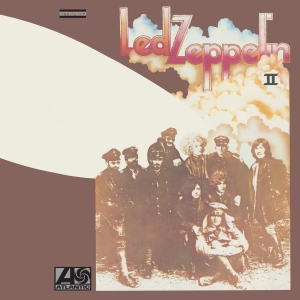
Led Zeppelin II is the second studio album by the English rock band Led Zeppelin, released on 22 October 1969 in the United States and on 31 October 1969 in the United Kingdom by Atlantic Records. Recording sessions for the album took place at several locations in both the United Kingdom and North America from January to August 1969. The album's production was credited to the band's lead guitarist and songwriter Jimmy Page, and it was also Led Zeppelin's first album on which Eddie Kramer served as engineer.

Led Zeppelin III is the third studio album by the English rock band Led Zeppelin, released on 5 October 1970. It was recorded in three locations. Much of the work was done at Headley Grange, a country house, using the Rolling Stones Mobile Studio. Additional sessions were held at Island Studios and Olympic Studios in London. As with the prior album, the band eschewed the use of guest musicians, with all music performed by band members Robert Plant (vocals), Jimmy Page (guitars), John Paul Jones, and John Bonham (drums). The range of instruments played by the band was greatly enhanced on this album, with Jones especially emerging as a talented multi-instrumentalist, playing a wide range of keyboard and stringed instruments, including various synthesizers, mandolin and double bass, in addition to his usual bass guitar. As with prior albums, Page served as producer on the album, with mixing done by Andy Johns and Terry Manning.
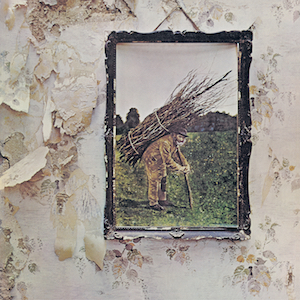
The untitled fourth studio album by the English rock band Led Zeppelin, commonly known as Led Zeppelin IV, was released on 8 November 1971 by Atlantic Records. It was produced by the guitarist Jimmy Page and recorded between December 1970 and February 1971, mostly in the country house Headley Grange. The album contains the band's most well-known recording, the eight-minute-long "Stairway to Heaven".
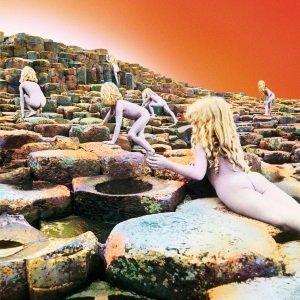
Houses of the Holy is the fifth studio album by the English rock band Led Zeppelin, released on 28 March 1973 in the United States and on 30 March 1973 in the United Kingdom by Atlantic Records. The album benefited from two band members installing studios at home, which allowed them to develop more sophisticated songs and arrangements and expand their musical style. Several songs subsequently became fixtures in the group's live set, including "The Song Remains the Same", "The Rain Song" and "No Quarter". Other material recorded at the sessions, including the title track, was shelved and released on the later albums Physical Graffiti (1975) and Coda (1982). All instruments and vocals were provided by the band members Robert Plant (vocals), Jimmy Page (guitar), John Paul Jones, and John Bonham (drums). The album was produced by Page and mixed by Eddie Kramer. The cover was the first for the band to be designed by Hipgnosis and was based on a photograph taken at Giant's Causeway in Northern Ireland.

Physical Graffiti is the sixth studio album by the English rock band Led Zeppelin. Released as a double album on 24 February 1975 in the United States and on 28 February 1975 in the United Kingdom, it was the group's first album to be released under their new label, Swan Song Records. The band wrote and recorded eight new songs for the album in early 1974 at Headley Grange, a country house in Hampshire, which gave them ample time to improvise arrangements and experiment with recording. The total playing time covered just under three sides of an LP, so they decided to expand it into a double album by including previously unreleased tracks from the sessions for the band's earlier albums Led Zeppelin III (1970), Led Zeppelin IV (1971) and Houses of the Holy (1973). The album covered a range of styles including hard rock, progressive rock, rock 'n' roll and folk. The album was then mixed over summer 1974 and planned for an end-of-year release; however, its release was delayed because the Peter Corriston-designed die-cut album cover proved difficult to manufacture.

Presence is the seventh studio album by the English rock band Led Zeppelin, released by their own label Swan Song Records on 31 March 1976 in the United States and on 2 April 1976 in the United Kingdom. While the record was commercially successful, reaching the top of both the British and American album charts, and achieving a triple-platinum certification in the United States by the RIAA, it received mixed reviews from critics and is the lowest-selling album by the band.
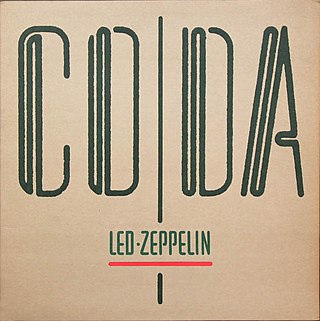
Coda is a compilation album by the English rock band Led Zeppelin. It contains rejected tracks from various sessions during the band's twelve-year career. The album was released on 26 November 1982, almost two years after the group had officially disbanded following the death of drummer John Bonham. The word coda, meaning a passage that ends a musical piece following the main body, was therefore chosen as the title.
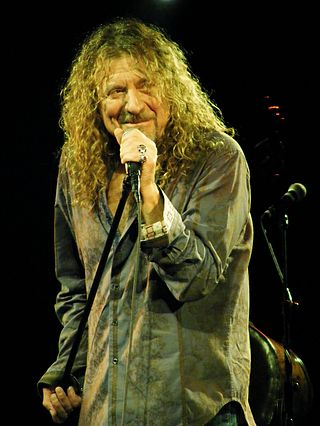
Robert Anthony Plant is an English singer and songwriter. He was the lead singer and lyricist of the rock band Led Zeppelin from its founding in 1968 until their breakup in 1980; since then he has had a successful solo career, sometimes collaborating with other artists such as Alison Krauss. Regarded by many as one of the greatest singers in rock music, he is known for his flamboyant persona and raw stage performances.
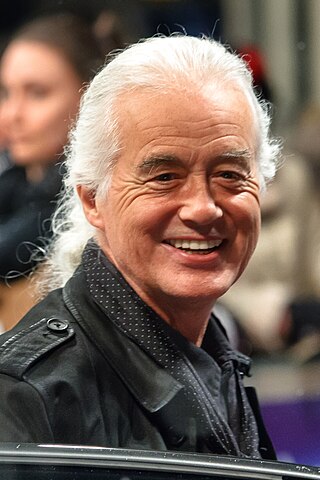
James Patrick Page is an English musician and producer who achieved international success as the guitarist and founder of the rock band Led Zeppelin. Prolific in creating guitar riffs, Page’s style involves various alternative guitar tunings and melodic solos, coupled with aggressive, distorted guitar tones. It is also characterized by his folk and eastern-influenced acoustic work. He is notable for occasionally playing his guitar with a cello bow to create a droning sound texture to the music.
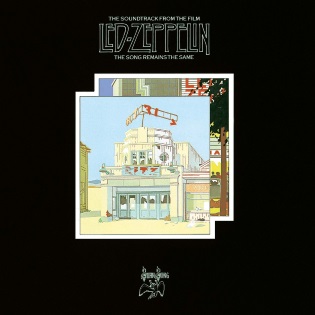
The Song Remains the Same is the live soundtrack album of the concert film of the same name by the English rock band Led Zeppelin. The soundtrack was recorded 27–29 July 1973 and released on 22 October 1976 on Swan Song Records.
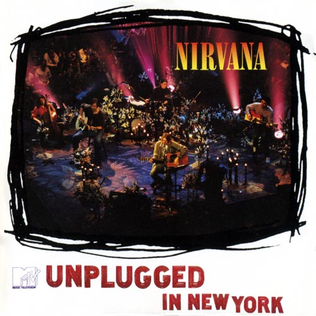
MTV Unplugged in New York is the first live album by the American rock band Nirvana, released by DGC Records on November 1, 1994, nearly seven months following the death of Kurt Cobain. The album was part of the cable television series MTV Unplugged and features a mostly acoustic performance. It was recorded at Sony Music Studios in Hell's Kitchen on November 18, 1993.
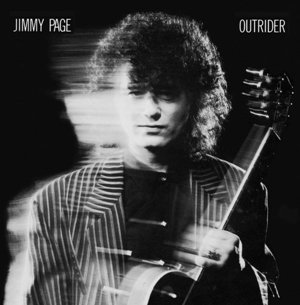
Outrider is an album by Jimmy Page, released by Geffen Records on 21 June 1988. It is his only solo studio album and the first time since 1969 he has recorded with a record label other than Atlantic Records/Swan Song Records. Page recorded the music at his personal studio The Sol. Robert Plant guests on one track, "The Only One", while John Bonham's son Jason plays drums.
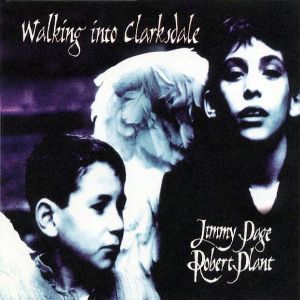
Walking into Clarksdale is the only studio album by Jimmy Page and Robert Plant, both formerly of English rock band Led Zeppelin. It was released by Atlantic Records on 20 April 1998. The album was recorded and mixed by Steve Albini at Abbey Road Studios.

Core is the debut studio album by the American rock band Stone Temple Pilots, released by Atlantic Records on September 29, 1992.

In Concert/MTV Plugged is a 1992 concert video and 1993 live album by Bruce Springsteen.

The discography of the English rock band Led Zeppelin consists of eight studio albums, four live albums, 10 compilation albums, 19 singles, 16 music videos and nine music downloads. The band is estimated to have sold over 300 million records worldwide, becoming one of the best-selling music artists in history. According to Billboard, they are the 40th Greatest Artist of All Time, as well as the 11th Most Successful Artist on Billboard 200 history. The band has scored 7 number-one albums on Billboard 200 and has sold 112.5 million certified albums in the United States, becoming the 5th best-selling album artist in RIAA history.

No Quarter is a live album by Jimmy Page and Robert Plant, both formerly of English rock band Led Zeppelin. It was released by Atlantic Records on 31 October 1994. The long-awaited reunion between Jimmy Page and Robert Plant occurred on a 90-minute "UnLedded" MTV project, recorded in Morocco, Wales, and London.
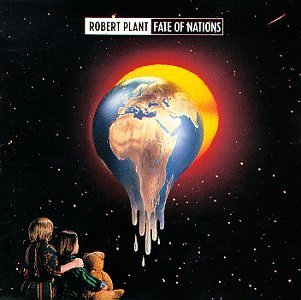
Fate of Nations is the sixth studio album by English singer Robert Plant, released 25 May 1993 on Es Paranza Records in North America and Fontana Records internationally. It features former Cutting Crew guitarist Kevin MacMichael on all songs and as well as being a backing vocalist. In addition, the album also features violinist Nigel Kennedy on one song. The song "I Believe" is a tribute to Plant's late son, Karac.

In Through the Out Door is the eighth and final studio album by the English rock band Led Zeppelin. It was recorded in three weeks in November and December 1978 at ABBA's Polar Studios in Stockholm, Sweden, and released by their label Swan Song Records on 22 August 1979 in the US and 24 August 1979 in the UK. Unlike earlier Led Zeppelin albums, In Through the Out Door was dominated musically by bassist and keyboardist John Paul Jones. It was the band's last release before the death of their drummer John Bonham in September 1980 and their disbandment three months later.
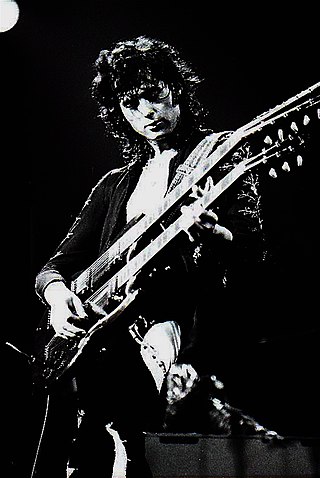
Jimmy Page is a British rock musician, best known as the guitarist and producer for English rock band Led Zeppelin. He has also participated in numerous solo and group projects since Led Zeppelin disbanded in 1980.




















